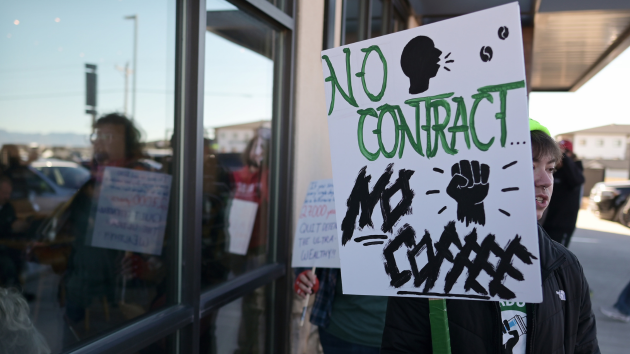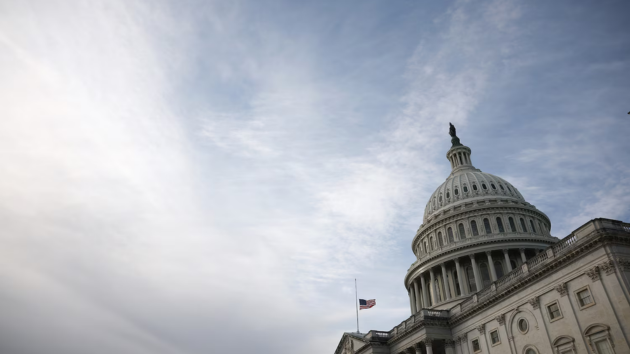Amid staggering student loan debt, Black women also face unequal pay
Written by ABC Audio ALL RIGHTS RESERVED on July 28, 2023

(NEW YORK) — Ravenn Moore, a 43-year-old mom in the Detroit area, said she accumulated tens of thousands of dollars of debt while earning both her bachelor’s and master’s degrees as a first-generation college student.
Over the next decade, Moore said the interest on her student loans caused her debt to balloon to over $100,000.
At the same time, Moore, who now works as the director of a nonprofit organization, said it took her a decade to reach a point in her career where she was earning over $50,000 per year.
“I thought [getting my master’s degree] would make a big difference in my income and in just my access to everything,” Moore told ABC News’ Good Morning America. “I value my education … but [given] the burden of the debt, I would have weighed matters a little differently 10 years ago if I knew it was gonna take me this long to get to a reasonable salary.”
Moore is unwittingly the subject of a wage gap that sees Black women in the United States being paid, on average, 67 cents for every dollar paid to white, non-Hispanic men. As a result, this year, Black women had to work until July 27, designated as Black Women’s Equal Pay Day, to make what their white, non-Hispanic male counterparts made in 2022 alone.
As a Black woman, Moore is also among the population most disproportionately impacted by student debt.
Moore said that today, as she faces what she describes as the constant, “extremely stressful” burden of her student debt, she would advise young Black women to educate themselves both about the wage gap and student debt.
“If I had to give advice to younger folks, I would say you really have to make sure that the amount you’re going to make, if you have to take out student loans, is going to be worth it,” Moore said. “And be prepared that if that job does not come along — can you cover your debt with a lesser-paying job?”
In the U.S., women hold nearly two-thirds of all outstanding student debt, according to an analysis by the American Association of University Women. Black women are the most likely of any gender group to have student loans, with around 1 in 4 Black women having student debt, according to the Census Bureau.
Black women also receive little help when it comes to repaying their student loans. Over a decade after starting college, Black women owe 13% more than they borrowed, while white men, on average, have paid off 44% of their debt, according to a report released last year by The Education Trust, a nonprofit organization focused on student equity.
Brittani Williams, a senior policy analyst in higher education at The Education Trust and a co-author of the report, is a mother of three who said she currently owes tens of thousands of dollars in student debt, a debt she said is continuing to grow as she currently pursues a doctorate degree.
Williams described obtaining a doctorate degree as a personal goal she’d held “for quite some time,” so it was one she was willing to pursue as she holds out hope it will pay off in the future.
“I think that although it came with me acquiring student loan debt, there’s still a notion for me as a Black woman that a higher degree still opens up space for upward economic mobility,” Williams told GMA. “And although Black women are not being paid comparable to white men or even white women in the workforce, there is still a benefit for a post-secondary degree for many paths or careers that people may choose to pursue.”
While Black women are often told that the way to improve their economic status is through education, real-world data shows otherwise, according to Emily Martin, vice president for education and workplace justice at the National Women’s Law Center, a policy organization that fights for gender justice.
“In no way does differences in education show up as a driver for the wage gap,” Martin told GMA. “In fact, when you compare White men and Black women at the same educational levels, you see wage gaps are typically similar or even larger than the overall wage gap.”
According to NWLC data, a Black woman with a doctorate degree working full time makes 65 cents for every dollar a white, non-Hispanic man makes working full time with the same education, amounting to a loss of more than $2.1 million over the course of a 40-year career.
Martin said women’s labor has historically been undervalued in the workforce, and Black women on top of that face both conscious and unconscious gender and racial stereotypes that contribute to lesser pay for the same work.
When it comes to student debt, Black women are more burdened with it in college due to several factors, including the change decades ago when financing for college began to fall more on individual families. Many Black women are also first-generation college students, which means they may have less knowledge of applying for financial aid and less knowledge of the ins and outs of repayment, experts said.
Moore said that as a first-generation college student, she not only had to pay for college herself, she also didn’t have her parents’ network to rely on when she graduated college and was looking for a high-paying job.
“Now that I am an established career professional, I know the importance of developing networks, but my parents didn’t know to create that foundation so they could say to me, like, ‘Hey, I have a friend who has a nonprofit,’ or, ‘Hey, I have a friend who has a business that you can go to where their starting salary is in the $60s or $70s,'” Moore said. “Those networks just didn’t exist.”
As a result of the wage gap, Black women, on average, lose $1,891 each month, $22,692 each year, and $907,680 over the course of a 40-year career, according to the NWLC.
“All of these numbers really demonstrate with a lot of clarity the compounding effect of the wage gap,” Martin said. “Black women are more likely to have significant student loan debt, in part, because their own mothers are less likely to be able to pay for their college, because they themselves were impacted by the wage gap through their careers. And then when you come out of college with that debt, the wage gap makes it obviously harder to get out of that hole.”
As someone who works in education policy, Williams said she both studies the impact of student debt on Black women and sees it play out in her everyday life. As she hopes for the best when it comes to herself finding a high-paying job that outweighs her student debt, she said the burden shouldn’t be on women seeking more education.
“The onus is not just on the borrower, so particularly for Black women being underpaid, I think the answer is to pay Black women more,” Williams said. “And we can’t just talk about how can we fix the student debt crisis without saying we need to fix the college affordability problem.”
In June, the Biden administration proposed a new rule that aims to revise the government’s loan payment system in favor of borrowers. As of now, the exact timing for when student borrowers could take advantage of the new payment plan — which would allow borrowers to pay less money back on their debt for a shorter amount of time — remains unclear.
The proposed rule came shortly after the administration’s broader, more well-known push to cancel millions of loans was struck down by the Supreme Court.
Martin said that from a policy perspective, the overwhelming nature of both the student debt crisis and the gender wage gap show they are problems that require “more than individual initiative” to solve.
“What I see when I look at those numbers is that we need to resituate our focus away from how Black women just need to go to school, be successful and change their lives,” Martin said, “to really looking at the policy changes and the institutional changes that we need to make as a country to ensure that education pays off for Black women every bit as much as it does for white men.”
Copyright © 2023, ABC Audio. All rights reserved.

 KVSP
KVSP 




